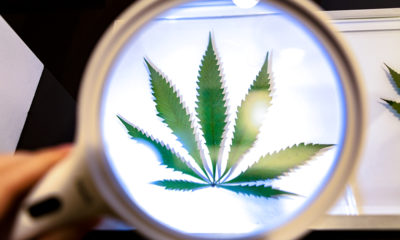Medical
Study Shows Cannabis Kills Leukemia Cells
Acute Lymphoblastic Leukemia
A UK study in the journal Anticancer Research has found that cannabis derived compounds kill cancer cells in leukemia patients.
Published last October, the findings indicate that certain non-psychoactive cannabinoids “caused a simultaneous arrest at all phases of the cell cycle… [and] resulted in dramatic reductions in cell viability,” according to the abstract of the study.
Researchers grew leukemia cells in a lab and cultured them with increasing doses of six cannabinoids, including CBD (Cannabidiol), CBDA (Cannabidiolic acid), CBG (Cannbigerol), CBGA (Cannabigerolic acid), CBGV (Cannabigevarin) and CBGVA (Cannabigevaric acid).
The cannabinoids were tested individually as well as within groups to see if they were effective at killing or stopping the growth of the cancer cells.
“Cannabinoids have a complex action; it hits a number of important processes that cancers need to survive,” the study’s author Dr. Wai Liu told the Huffington Post. “For that reason, it has really good potential over other drugs that only have one function. I am impressed by its activity profile, and feel it has a great future, especially if used with standard chemotherapies.”
The cannabinoids were non-psychotropic and did not cause a “high.” They were specifically chosen, rather than just being part of the conglomerate 80 to 100 cannabinoids in traditional cannabis oil. Liu said the application of the cannabinoids was far more specific than just smoking cannabis.
“Smoking cannabis introduces a number of potential problems,” Liu told the Huffington Post. “First, the complex makeup of cannabis that contains about 80 bioactive substances means that the desired anticancer effect may be lost because these compounds may interfere with each other. Second, we see that delivering the drug either by injection or by a tablet would ensure the most effective doses are given. Smoking would be variable, and indeed the heat of the burning may actually destroy the useful nature of the compounds.”
The compounds are produced naturally and target the same cancer pathways targeted by numerous expensive pharmaceuticals.
“There’s quite a lot of cancers that should respond quite nicely to these cannabis agents,” Liu told the U.S. News & World Report. “If you talk about a drug company that spent billions of pounds trying to develop these new drugs that target these pathways, cannabis does exactly the same thing – or certain elements of cannabis compounds do exactly the same thing – so you have something that is naturally produced which impacts the same pathways that these fantastic drugs that cost billions also work on.”
The findings back up the experience of Alysa Erwin, diagnosed with brain cancer at the age of 14. After essentially being given a death sentence with less than two years to live, Erwin began consuming cannabis oil. Two years after suffering the headaches that led to her diagnosis, Erwin is now cancer free and has been for a year.
“Once I found out about this oil it just gave me hope. That’s what gave me hope for this cancer being gone,” Erwin told the Detroit Metro Times. “I like to let other families know that so they can have that kind of hope.”

























